Do you know how to recognize a healthy ferret poop?
What does green, orange, black, or yellow poop mean?
Some of them are normal, some of them are a sign of digestive trouble. Here you can read all about each color, why they happen, and other important poop situations. For example, what to do when a ferret is straining to poop or has a seedy poop. Also, for easier poop comparison you can check out the ferret poop chart down below.
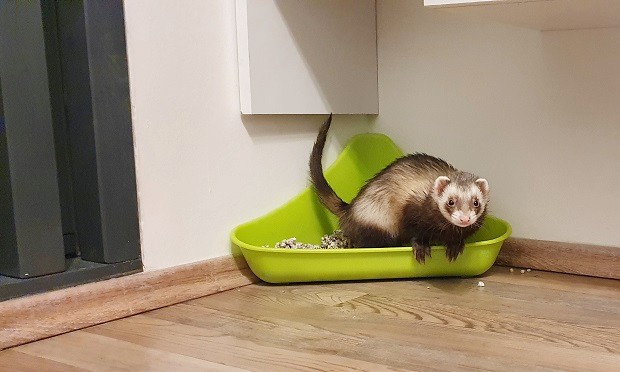
TABLE OF CONTENTS
Where and How Much Do Ferrets Poop?
Pooping is natural and everybody does it. Ferrets have a fast metabolism so they will poop many times a day. That is normal and expected, especially when they are kits. At a young age, ferrets produce much more poop than adults.
Ferrets will use a litter box so it is good to put one in their cage and one somewhere in your room. That way they don’t have to run in the cage when they are playing to do their business. Most ferrets figure out what litter box is quick, but if you want to speed up that process, read my post about litter box training tips.
If you feed your ferret with good quality kibble, you will see poop a few times a day. But, if you feed your ferret with raw meat nutrition, then you will see less poop. That is normal because they can use more nutrients from raw meat than they can from kibble. But, heads up, ferret raw meat poop can be very different. It depends on the meal and it can be different in color and consistency so prepare yourself for different litter box surprises. If you want to read more about raw meat nutrition, check out my post about ferret’s nutrition.
Why Should You Check Ferret Poop?
One of the easiest ways to know if your ferret is healthy is by checking his poop. When I say checking his poop, I don’t mean touching it. I mean looking in the litter box and see what it looks like. Check the color and the structure of the poop.
When it comes to color, it can be in many colors from green, yellow, orange, brown to dark brown, even black. When it comes to the structure, it can be hard, soft, runny, seedy (or grainy) and it can have mucus. Each and every adjective I used has a meaning and that is why we are here.
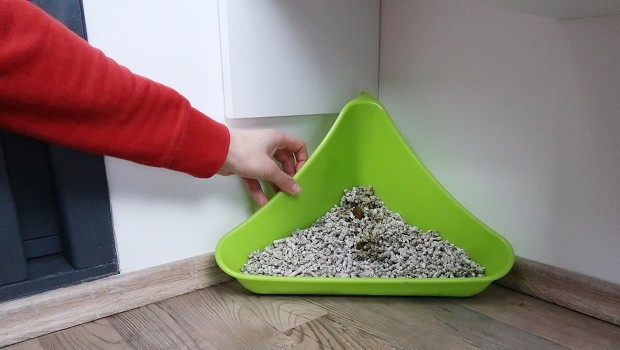
The interesting part about poop is that it is not just a sign of a medical problem. When you see an abnormal poop, that can also mean that your ferret is under stress. That is a non-medical-related situation you should solve too. For example, it can be related to traveling, moving, visiting the vet, meeting other animals, etc.
Another pretty serious problem with poop (or without one) is a blockage. When your ferret eats something wrong, for example, rubber, fabric, piece of plastic, etc that small piece can cause a blockage. It can stay in their digestive tract which can be fatal for them. The biggest symptom is that your ferret is not pooping. If your ferret is straining to poop and poop comes out much thinner than usual, it is probably blockage too. So if you don’t see poop and your ferret is vomiting, constantly sleeping, or doesn’t move, GO TO THE VET IMMEDIATELY.
How Does Normal Ferret Poop Look Like?
A healthy ferret poop is brown with a firm structure. Someone once compared that a ferret poop looks like toothpaste and I couldn’t agree more. This poop comes out without a struggle and the entire process is done in a few seconds. A normal ferret poop is the most common poop (of course) and its structure is the same from top to bottom.
What Do Other Poop Colors Mean?
As I have already mentioned, there are many colors and structures in a ferret poop. Here I will explain the most common poop types by color and by structure and what causes them. Those aren’t considered normal poops, some of them require your reaction, while others require monitoring.
Green Ferret Poop
As the color says, green poop isn’t a good poop. In 99% of cases, it is ECE ferret poop. It is called that way because the most common illness that results in a green poop is ECE – epizootic catarrhal enteritis. Ece affects the intestinal tract and besides green, mucous-covered diarrhea, it causes lethargy, vomiting, and lack of appetite. But, the biggest symptom is bright green poop and that is why ferret owners call it green slime disease. Just like other illnesses, this one can have mild to severe symptoms. The most important thing in this disease is to keep the ferret hydrated because it can lose fluids quickly. Also, it is highly contagious so keep the affected ferret away from other ferrets in your home.
On the other hand, if your ferret experiences dark green poop, it might be from stress. So if your ferret experienced some specific situation that could cause him stress, it might result in this type of poop. Make sure to monitor your ferret and remove the stress from his life if you know what caused it.
Black Ferret Poop
Black ferret poop can be a sign of a medical condition but it also doesn’t have to be, if you feed your ferret with raw meat. If your ferret eats liver, hearts, and other dark-colored organs, that poop is mostly dark brown to black in color. It is also soft. That is normal, but that is only normal after that certain meal.
If your ferret has black poop and it eats kibble, then the cause is something else. That poop color si usually combined with tarry consistency and mucus. Black poop is a sign of blood in feces, but the color means the blood comes from a stomach or throat. The black color means the blood is digested before it reaches the intestines. Often that ferret is also lethargic, refuses to eat, vomits, etc. That is a serious problem and something you should consult with the vet.
Bloody Ferret Poop
When you see blood in a ferret poop, that means the problem is in the intestines, near the anus and rectum. Most of the time it refers to some type of damage so your reaction is pretty important and it means you have to go to the vet. One of those “damages” is a prolapsed rectum and that is pretty visible.
You can easily recognize this poop because the blood is not processed like in the black ferret poop situation so it stays red. Most of the time ferret bloody stool is accompanied by pain and problems with defecation.
One rare situation when red ferret poop is harmless is when there is food dye in kibble. It can happen so you can check the ingredients and see if your ferret shows any signs of pain during defecations. But, don’t use kibble that has food dye in it because most high-quality kibbles don’t have it.
Yellow Ferret Poop
Most of the time, yellow ferret poop is not alarming so this is one of those situations where you should monitor your ferret. If a ferret poops yellow it may be a result of the last meal, especially if you gave him an egg. So with that in mind, there is nothing to worry about. We can’t know that for sure so the best thing you can do is monitor your ferret and wait for the second poop. If the second poop is a healthy ferret poop, then you have nothing to worry about.
But, if a yellow poop is also a seedy ferret poop, then there can be a problem behind it. A yellow ferret liquid poop can be one of the symptoms of ECE I mentioned in the green ferret poop. If there isn’t any other symptom then monitor your ferret and isolate it from other ferrets if you have more of them.
Another cause of yellow poop can be trouble with digestion. It usually means that the food your ferret ate passed through the system too quickly. It can be a one-time thing or it can happen frequently. If it happens frequently, go to the vet for advice. Your ferret might need a complete change of diet.
Orange Ferret Poop
The orange ferret poop is another abnormal poop with one exception. The only way it can happen is when you feed your ferret pumpkin. You shouldn’t feed your ferret pumpkin on regular basis, people use pumpkin to help ferret with hairballs or if they suspect a blockage.
If you haven’t given your ferret pumpkin and there is an orange poop, it might be similar to the yellow poop situation. Your ferret might have eaten something and upset its stomach so monitor your ferret and wait for the second poop. If it is a normal ferret poop, you have nothing to worry about.
What Do Other Poop Types Mean?
Just like with the color, the poop can be a different type. It can be liquid, seedy, filled with mucus, too small, or too thin. Let’s cover those characteristics too.
Seedy Ferret Poop
The most common abnormal ferret poop is seedy ferret poop. This type of poop is also called grainy ferret poop. It usually happens when you change your ferret’s diet. It can be a different kibble or complete kibble to raw meat transition. Seedy ferret poop usually means that your ferret didn’t digest food properly, it came too quickly through the system and it usually means undigested fats. When it happens due to the change in diet, it is nothing to worry about.
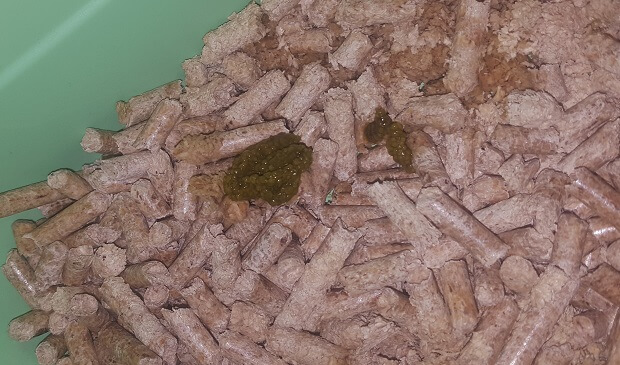
But, if your ferret experiences grainy ferret poop and you didn’t change the diet, then the problem is something else. It could be stress, but it could also be parasites or some other digestive problems. If seedy ferret poop continues, go to the vet for a checkup.
Ferret Runny Poop
The ferret runny poop, liquid poop, or loose stool all mean the same – diarrhea. The problem with diarrhea is that it has too many causes. It can be from stress, poor diet, a one-time thing, or something more serious like ECE. That is why it is important to compare the color too so you can give better conclusions. Monitor your ferret, check his behavior. If your ferret acts differently (tired, sleepy, vomiting) then it is time to check the vet.
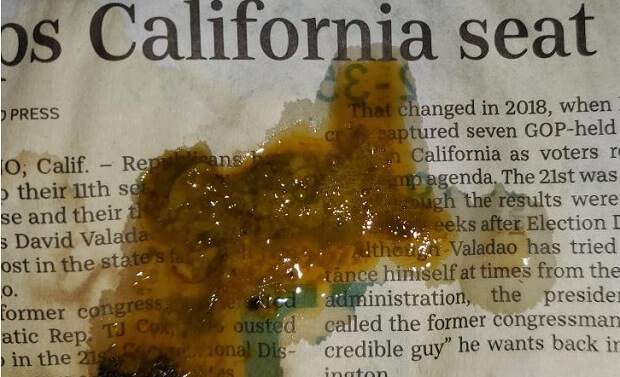
On the other side, if nothing is different in the behavior and the ferret loose stool was a one-time thing, it was probably just an upset stomach. If diarrhea continues, monitor your ferret, keep your ferret hydrated and contact your vet.
Mucus Ferret Poop
Healthy ferret poops don’t have mucus so it means something isn’t right. It can be a one-time thing, but if it happens too many times then it is a thing you should be concerned about. Mucus is a sign of bowel trouble. If a color is OK and you introduce a new treat or kibble, it might be from that. If you had some unexpected situation with your ferret, it could be from stress.
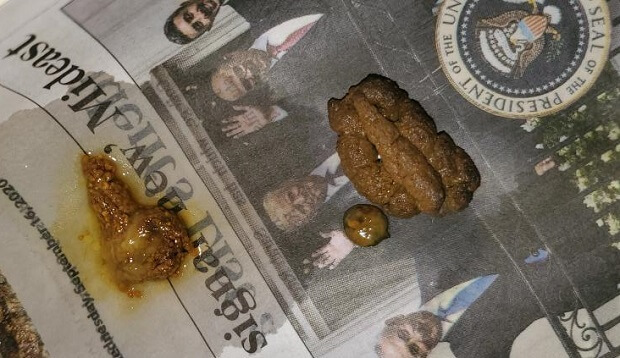
The most important thing in mucus poop situations is how long the mucus ferret poop lasts. If it lasts a long time, then it is a serious issue and you should contact your vet. The most common disease that results in ferret mucus poops is ECE. Besides the green color, that poop comes with mucus.
What If My Ferret Doesn’t Poop?
If your ferret hasn’t pooped in the last 12-24 hours, that needs your immediate reaction. If your ferret doesn’t poop or is ferret pooping small amounts like thin spaghetti then you are dealing with a full or partial blockage. That is a very serious problem and it can happen with many things. The most dangerous material for a ferret is rubber because they love to chew it. Other dangerous materials are a sponge, plastic, fabric, etc.
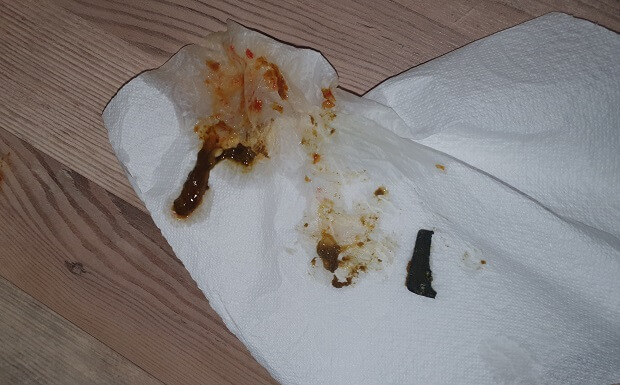
You should react as soon as possible because a blockage can be fatal for ferrets. Besides the fact that diarrhea and vomit make them dehydrated, which is very dangerous. Another dangerous situation with blockage is that closed intestines gather gas which eventually leads to fatal consequences.
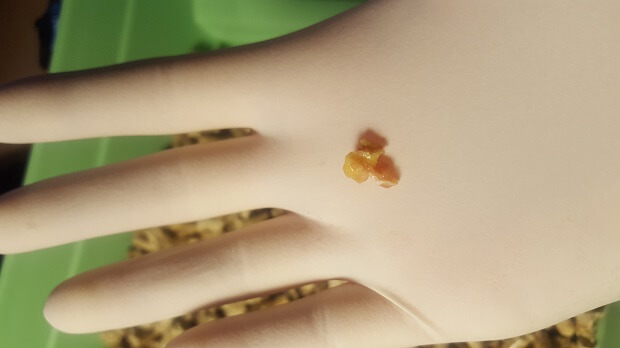
But, it can also happen with bones if you feed your ferret raw meat. I’ve had a couple of bone situations over the last few years with Yoda. Most bones did manage to pass through the system eventually, but one bone was stuck so the vet had to perform surgery. Yoda was energetic, but nothing would stay in the system. Yoda was vomiting everything, even water and that was our sign to rush to the vet. Luckily, everything went OK because we reacted less than 24 hours after the incident. So, time is very important in this situation so make sure you react quickly.
Share Ferret Poop Pictures With Us!
I want to update the ferret poop chart with bigger pictures and I need your help with it! Share ferret poop pictures with us so we can have at least one example for every poop color and structure. Send the picture with the explanation to support@friendlyferret.com or via our contact form. I will give you credit so make sure you leave at least your name or nickname in the email with the picture.
Conclusion
Checking ferret poop is not a crazy thing to do. You can learn a lot from the shape, color, and consistency of the poop. A healthy ferret poop is the best one and we all want to experience only the normal ferret poop. But, that is not the case in most situations so we have to be prepared. This ferret poop chart with explanations is a great way to prepare yourself for every trouble. Keep your ferrets healthy and check their poop regularly! What poops your ferrets had from the chart and why? Share your experience in the comments below! Also, don’t forget to subscribe to Friendly Ferret newsletter!
Ferret Poop Chart
Thank you All About Ferrets and © Ferret Harmony for providing us with these poop charts!
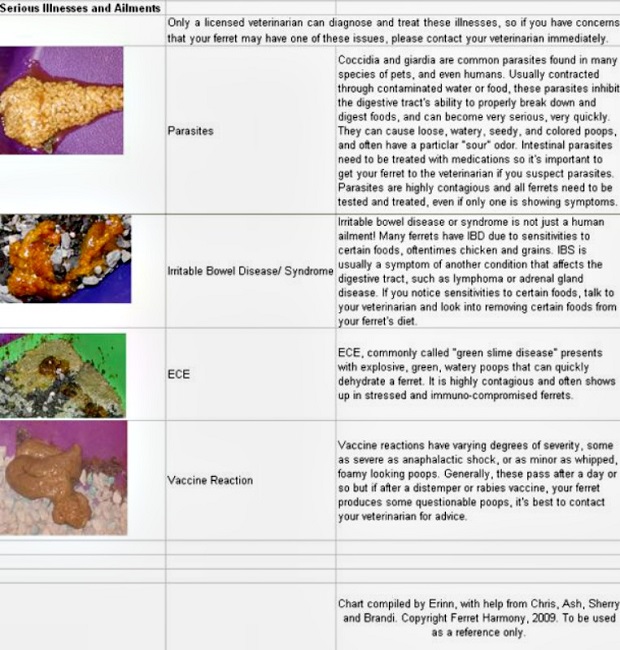
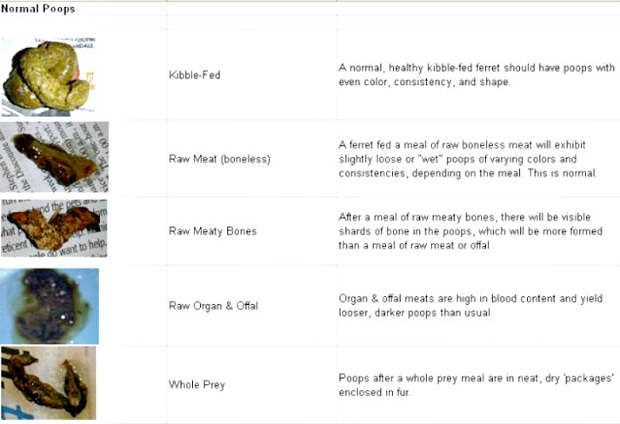
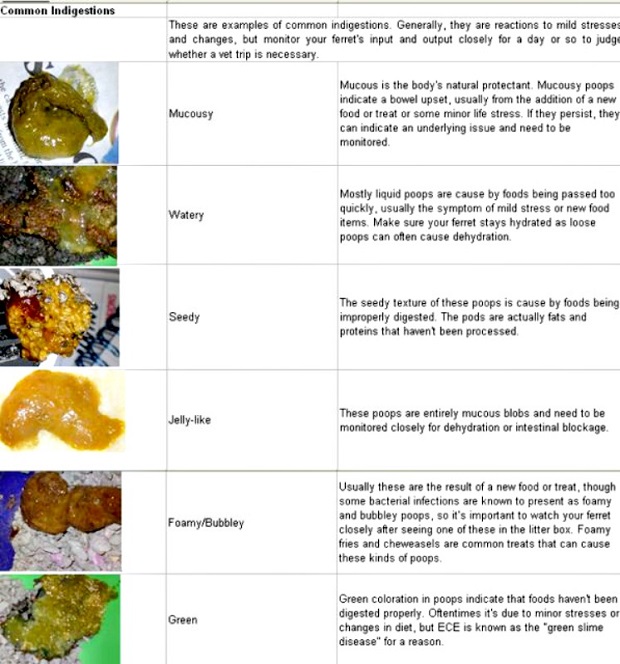

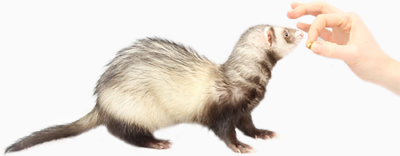
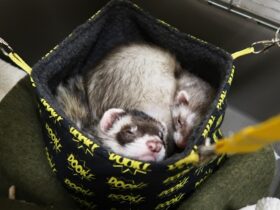

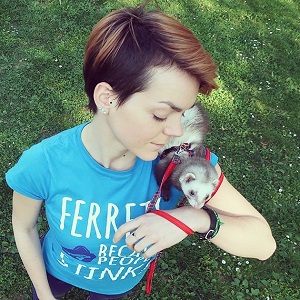

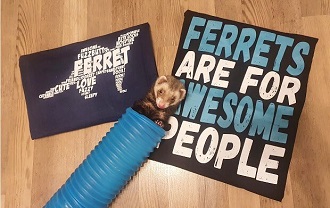
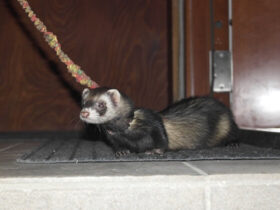




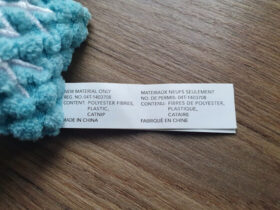
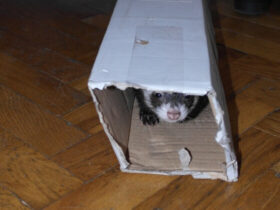
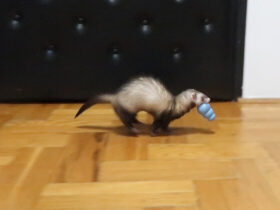

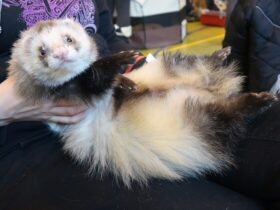
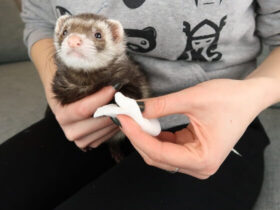
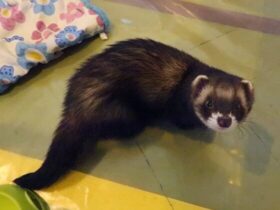
Hello! My ferret, Zulu, pooped a white-ish green color. It had mucous but it had the texture of normal poop. It was firm but I don’t remember if it was seedy. I checked their litter box this morning to all healthy looking poop. Zulu has also been sleeping a lot more and being sort of lethargic. Should I be worried? Are these serious symptoms of ECE?
The ECE usually comes with bright green diarrhea and it often comes a few times not just once. If your ferret is still lethargic, make sure he drinks enough fluid and it can be something else, not just ECE so a trip to the vet is a good idea.